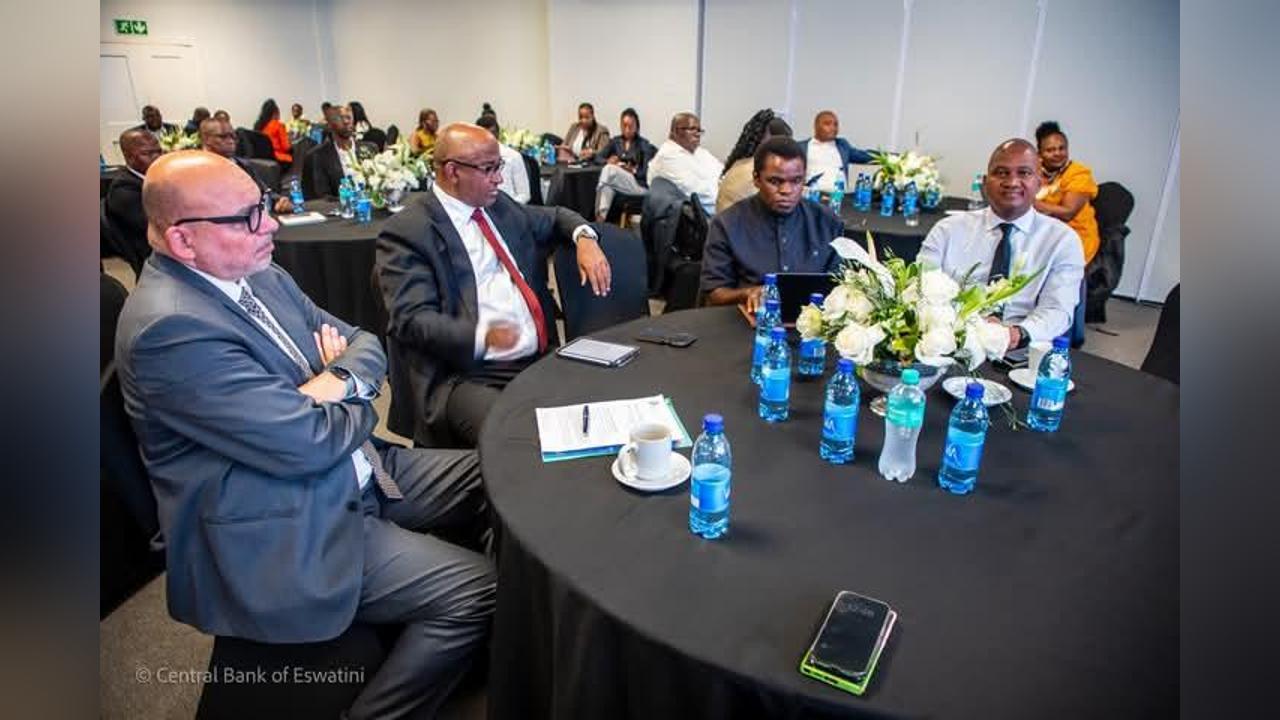Africa-Press – Eswatini. At a recent national symposium on financial inclusion, the Governor of the Central Bank of Eswatini, Dr. Phil Mnisi, delivered a keynote address in which he emphasized the importance of collaboration and shared commitment in driving forward the country’s financial inclusion agenda.
Dr. Mnisi stated that it was an honour and privilege to address attendees at the symposium, describing it as a platform to reflect on collective progress and reaffirm a shared commitment to building a more inclusive and resilient financial ecosystem.
He acknowledged the presence of the CEO of the Alliance for Financial Inclusion (AFI), calling it both symbolic and practical.
He said the presence of AFI leadership reaffirmed the organisation’s support for Eswatini’s financial inclusion journey and highlighted the strength of the ongoing partnership.
Dr. Mnisi extended gratitude to the stakeholder community, including government ministries, financial institutions, regulators, consumer advocates, and development partners.
He noted that their efforts from strategy development to grassroots implementation continued to be instrumental in driving national progress.
Reflecting on Eswatini’s achievements, Dr. Mnisi highlighted the hosting of the AFI Working Group Meetings in May 2023 as a moment of pride.
He said the event brought together global experts and helped to enrich Eswatini’s financial inclusion efforts through knowledge exchange.
He reported that Eswatini’s relationship with AFI had strengthened over the years and that the organisation’s technical assistance, policy leadership, and peer learning mechanisms had supported national and institutional financial inclusion goals.
Dr. Mnisi noted the successful launch of Eswatini’s National Financial Inclusion Strategy 2023–2028 in May 2024. He said the strategy outlines a bold roadmap for improving access to
financial services, particularly for underserved communities. He thanked AFI for its support in shaping the strategy and praised the Centre for Financial Inclusion (CFI) under the Ministry of Finance for its leadership in coordinating efforts.
“ Financial inclusion has been formally embedded in the Central Bank’s core policy objectives a dedicated Financial Inclusion Division has been established to coordinate related initiatives. These include promoting financial literacy and expanding access to quality financial services,” said the Governor.
Dr. Mnisi also referenced the launch of the Gender Financial Inclusion Roadmap in 2022 and mentioned ongoing efforts to develop a national Fintech strategy and digital payment infrastructure.
He said that consumer protection had been strengthened and that inclusive green finance was advancing through the development of the Eswatini Green Finance Taxonomy.
He added that national outreach campaigns and efforts to integrate financial literacy into school curriculums were underway, and that a sex-disaggregated data project had been launched in partnership with FSRA and CFI to enhance gender-sensitive policymaking.
According to Dr. Mnisi, a new technical assistance project in collaboration with the World Bank was also underway.
He said one of its key outputs would be a supply-side gender disaggregated data diagnostic, aimed at informing a national roadmap for gender and financial inclusion.
Despite progress, Dr. Mnisi acknowledged that challenges remained. He reported that a 14% gender gap in bank account ownership persisted, with 48% of women banked compared to 62% of men.
He said addressing this disparity required urgent and targeted action.
Dr. Mnisi concluded his address by affirming Eswatini’s ongoing commitment to building a more inclusive, equitable, and resilient financial system. He called on stakeholders to continue working together and to use partnerships such as the one with AFI to drive meaningful impact.
Meanwhile the Governor also reported that, over the past decade, Eswatini had made notable progress in expanding access to financial services.
He said financial inclusion in the formal sector had grown from 53% in 2011 to 87% in 2023, due to cooperation from government, financial institutions, and development partners.
However, he cited the findings of the 2023 Blended FinScope MSME Survey, which revealed that only 5% of MSMEs had access to credit from banks and only 4% had insurance coverage. He said these figures pointed to deeper systemic issues that required collective action.
The Governor emphasized that the National Financial Inclusion Strategy 2023–2028 offers a roadmap for addressing these gaps. He said the strategy focuses on building financial capabilities through education, strengthening the MSME sector, and enabling economic participation for vulnerable demographic groups.
He added that the strategy supports efforts aligned with the Eswatini National Development Plan and the UN Sustainable Development Goals by prioritizing access and usage of financial services that lead to real developmental outcomes.
Describing the symposium as a call to action, the Governor said it was an opportunity to reflect on how the financial sector could better reach underserved populations. He encouraged participants to explore how data, collaboration, and innovation could help close the inclusion gap.
He outlined three key messages for the financial sector: First, he said the sector must continue to evolve, with all players including banks, microfinance institutions, and fintech companies developing services tailored to the needs of MSMEs, women, youth, and rural populations.
Second, he highlighted the importance of data, stating that investment in collection, analytics, and reporting was essential for evidence-based policymaking.
Third, he underscored the need for collaboration, stating that financial inclusion could not be achieved by any one institution alone.
He said partnerships across sectors and borders were vital, and that the National Financial Inclusion Strategy provides a solid framework to guide such efforts.
In his closing remarks, the Deputy Governor reiterated the Central Bank’s commitment to learning, sharing, and innovating within the AFI network to create a more inclusive financial future for all citizens.
He thanked stakeholders for their ongoing efforts and said he looked forward to productive discussions and meaningful outcomes from the symposium.
For More News And Analysis About Eswatini Follow Africa-Press







